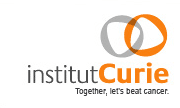Emmanuel Barillot (U900 Inserm, Mines Paris Tech, Institut Curie, Paris) and Yves Moreau (Katholieke Universiteit Leuven) organized training workshops on microarray data analysis, biological network analysis, and other omics data analysis. This web page summarizes the documents and links used at these workshops.
INSERM workshop: Polymorphisms and genomic rearrangements: analysis of CGH and SNP array data
 |
Phase 1. Critical assessment. April 15-17,2009 . Saint-Raphael.
Phase 2. Practical course. June 02-03,2009 . Institut Curie (Paris).
Organizers: U900 Inserm (Emmanuel Barillot, Philippe Hupe, Stephane Liva, Philippe La Rosa)
and Katholieke Universiteit Leuven (Yves Moreau, Leon-Charles Tranchevent, Steven Van Vooren, Sylvain Brohee)
In April 2009 Barillot's lab at Institut Curie and Moreau's lab at Katholieke Universiteit Leuven organized a workshop, as part of the series of INSERM training workshops and with INSERM support. This workshop aims at providing the participants with the concepts and practical tools necessary for the analysis of CGH array and SNP array data in the context of cancers and constitutional disorders. The goal is both to master these approaches for fundamental research in molecular biology and for applications in clinical research or practice (diagnosis and prognosis).
From a bioinformatics point of view, genomic DNA microarrays raise specific problems, at the level of primary data analysis (design of experiment, normalization, identification of chromosomal breakpoints and of recurrent aberrant regions) as well as for the biological interpretation of the results (classification, correlation with expression data, data integration, functional annotation, and so on). The use of bioinformatics tools must rely on a comprehensive understanding of data acquisition and of experimental biases, as well as of the assumption that underlie the modeling of this data.
Phase 1. Critical assessment:
The presentation materials of the speakers will be available soon.
Phase 2. Practical course:
|
|